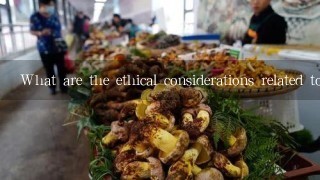What are the ethical considerations related to food preservation technology?

Ethical Considerations Related to Food Preservation Technology
1. Safety and Health:
- Use of hazardous chemicals or radiation.
- Potential for food contamination or spoilage.
- Consumer health risks associated with residues or byproducts.
2. Environmental Impact:
- Energy consumption and greenhouse gas emissions.
- Use of packaging materials and transportation.
- Impact on biodiversity and ecosystems.
3. Food Quality and Authenticity:
- Modified or synthetic ingredients.
- Loss of natural flavors and textures.
- Potential for nutrient loss or degradation.
4. Transparency and Disclosure:
- Labeling requirements and claims.
- Consumer trust and accountability.
- Disclosure of ingredients and additives.
5. Ethical Use of Resources:
- Water and energy consumption.
- Use of bio-based or sustainable ingredients.
- Fair trade practices and labor conditions.
6. Consumer Rights and Choice:
- Informed consent and choice.
- Availability of non-preserved or minimally processed options.
- Consumer control over food choices.
7. Social Responsibility:
- Employment and livelihoods.
- Ethical treatment of workers and farmers.
- Community engagement and education.
8. Ethical Innovation:
- Balancing innovation with ethical considerations.
- Transparency and accountability in research and development.
- Addressing social and environmental impacts.
9. Food Security and Access:
- Ensuring access to safe and nutritious food.
- Addressing food deserts and malnutrition.
- Promoting sustainable food systems.
10. Public Health and Safety:
- Foodborne illness outbreaks and recalls.
- Consumer confidence and trust.
- Compliance with regulations and standards.
Additional Considerations:
- The ethical implications of food preservation technology can vary depending on the context and application.
- Balancing the benefits of preservation with the potential risks is a complex balancing act.
- Consumer education and engagement are crucial for informed decision-making.
- Ethical considerations should be considered throughout the entire food supply chain, from production to consumption.



















































